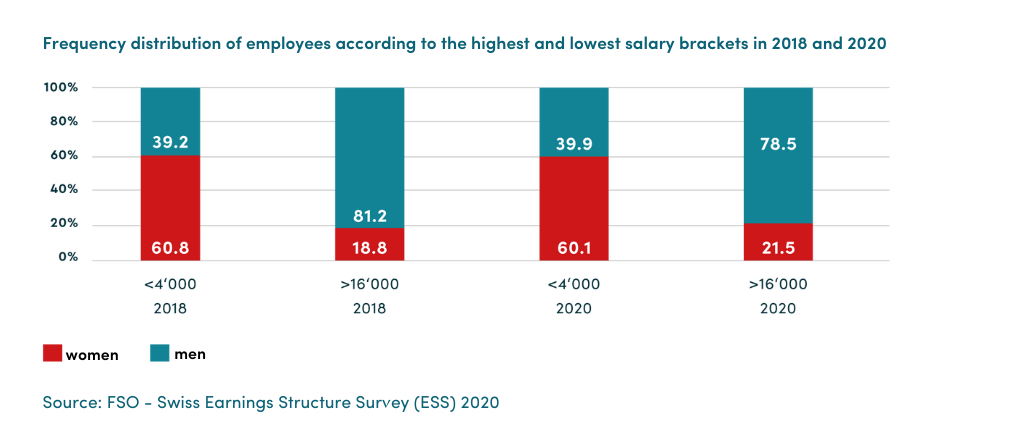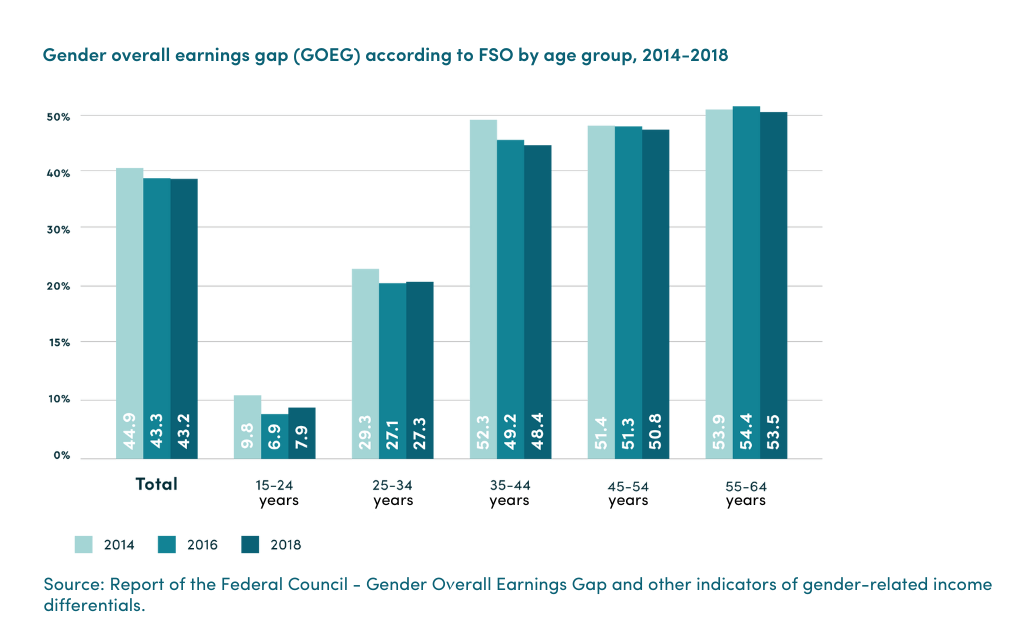The million gap: why Switzerland is top when it comes to employment inequality
14 December 2023
Have you ever thought about reducing your workload or taking a career break? The answer is going to differ depending on whether you are a man or a woman. In terms of career and income, there is hardly a bigger gender gap than in Switzerland. Unfortunately, taking time off for family reasons and working part-time comes at a high price. Even a one-year interruption leads to a permanent 3% reduction in salary. Anyone who interrupts their career for 5-6 years, as many women do in Switzerland, is missing out on a whole million at the end of their working life.
Download the whitepaper (German only)
Switzerland occupies a top position in terms of employment inequality. Overall, women earn a whopping 43% less than men throughout their working lives. In a European comparison, Switzerland, together with Austria and the Netherlands, brings up the sorry rear in terms of the gender pay gap. Countries such as Sweden with around 24% or Denmark with 25% show that things can be done differently.
Not only individual, but also macroeconomic consequences
In a jointly published whitepaper, Advance, the leading business association for gender equality in Switzerland, and KPMG shed light on the background and possible solutions for closing this gap. This is not just about individual effects, especially for women, but also about an overall economic inefficiency that Switzerland can hardly afford in view of demographic change and skills shortage. Although the number of working women is high overall, many of them work small hours while taking on most of the unpaid work at home. According to the Federal Statistical Office, total unpaid work has an estimated monetary value of CHF 434.2 billion. Women contribute around 60% of this amount.
Women are clearly outnumbered in higher-paid professions
Another reason for the enormous gender pay gap is that women are heavily overrepresented in low-paid professions, while men occupy most higher-paid positions. For example, over 60% of employees (in full-time employment) with a gross monthly salary of less than CHF 4,000 are female. In contrast, almost 80% of employees with a gross monthly salary of over CHF 16,000 are male. This horizontal gender segregation is strikingly more pronounced in Switzerland than in most other countries. Why is that?
Many women drop out of the race in the “rush hour” of life
Deeply rooted gender roles are the driving force behind the employment gap, alongside expensive childcare structures and the difficulty of balancing work and family life. Despite a good education, women still usually take on the traditional household and family tasks when starting a family. 69% of Swiss couples start a family between the ages of 31-40 (FSO). According to the Gender Intelligence Report (2023), however, the largest proportion of all promotions (43%) takes place in this age group, and women are missing out. The result: delayed careers, part-time careers and wage losses that are often almost impossible to compensate for or reverse. Women should therefore be aware of the long-term effects and make well-informed decisions, particularly with regard to their financial independence and pension plan. It’s a sad fact: currently, 67% of female pensioners in Switzerland are financially highly dependent..
Stereotypical role models have an impact on career choices …
… especially in the STEM fields (science, technology, engineering and mathematics). However, it is precisely the STEM professions that offer particularly high salaries and play a key role in our modern economy. Women are massively underrepresented here. In a European comparison, Switzerland also comes last in this respect. According to the latest figures from Eurostat, just 31% of master’s degrees in STEM fields are awarded to women, compared to over 43% in Denmark and over 48% in Serbia, for example. The KOF Swiss Economic Institute shows an even lower figure of just 26% for 2021 (the deviation is probably due to slightly different definitions of the subject areas).
How can we close the gap?
The editors of the whitepaper propose the following measures as concrete solutions:
- Information about financial consequences: Companies should provide transparent information about the financial implications of career decisions and options for compatibility of family and work with a minimum workload of 70% (this ensures sufficient pension fund contributions). Young parents must be able to make informed decisions. Only if we communicate openly about possible consequences can we create the basis for well-founded decisions.
- Promoting girls’ career choices: It is crucial to break through stereotypical gender roles in career choices. Through targeted education and awareness, we can encourage girls to take an interest in STEM professions and fully exploit their talents. This requires commitment not only from schools, but also from parents, teachers, the media and society as a whole.
- Nationwide introduction of day schools and flexible structures: It is crucial to support day schools and flexible working models that enable parents to share their family responsibilities fairly. These measures not only help women, but also men, to better reconcile career and family and accelerate the necessary cultural change.
Media contact for further information
Alexandra Rhiner, Communication Manager Advance, alexandra.rhiner@weadvance.ch
Discover our whitepapers


